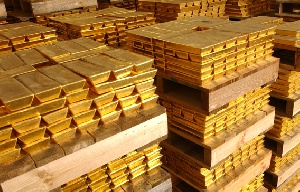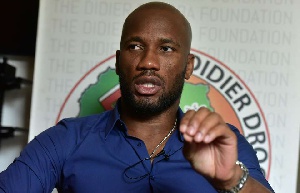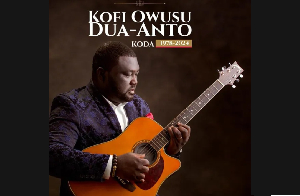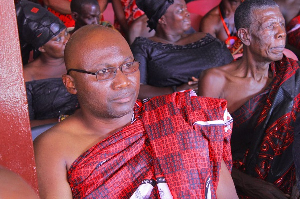- Home - News
- TWI News | TV
- Polls
- Year In Review
- News Archive
- Crime & Punishment
- Politics
- Regional
- Editorial
- Health
- Ghanaians Abroad
- Tabloid
- Africa
- Religion
- Election 2020
- Coronavirus
- News Videos | TV
- Photo Archives
- News Headlines
- Press Release
General News of Friday, 15 February 2013
Source: Daily Guide
$45m gold deal: The inside story
Fresh evidence gathered indicates that the controversial 1.5-tonne gold ferried from Ghana and seized by Turkish authorities early January indeed belongs to Ghanaian mining company, Omanye Mining Company Ltd.
The matter had been in a Ghanaian court where the owners of the gold engaged in a bitter legal dispute with the buyers, even though National Security Coordinator, Larry Gbevlo-Lartey said there was no gold exported outside the country.
“My gut feeling about this whole thing is that it is a scam. That (substance) is not real gold; eventually we will come to that [conclusion]”, Gbevlo-Lartey told Joy FM yesterday.
He said basic questions about the haulage would throw up sufficient doubts about whether the cargo found in the flight was actually gold.
However, a February 1, 2013 judgment (Suit number AC 184/2013) of an Accra High Court presided over by Justice Daniel Mensah, ordered a Dubai-based businessman, Vahid Moradi Moghaddam and Master Sara Turizm Import and Export Company, who collectively ordered the gold from Omanye Mining, to pay the cost of the gold, totaling $45.5million, in addition to interest.
The deal had earlier been pegged at $80million.
On January 11, 2013, Omanye Mining Ltd filed a law suit against Vahid Moradi Moghaddam and Master Sara Turizm Company for failing to pay for their order.
On February 1, 2013, Justice Daniel Mensah, in a default judgment, made an order for the Dubai-based entities to pay the Ghanaian gold firm.
The ruling was contrary to impressions widely created to indicate that Omanye Mining Ltd. might have been illegally involved in the Turkish gold haul, which generated serious controversy in Ghana since early January.
According to the writ of summons filed at the High Court by Omanye Mining Ltd, and made available to DAILY GUIDE, on December 5, 2012, Omanye Mining entered a sales agreement with Redmax General Trading LLC where Vahid Moradi Moghaddam is the Chief Executive.
It was agreed that Omanye Mining should supply 1,500kg to the Dubai based interests.
Based on the preliminary agreement, the Ghanaian company went ahead to ship the first consignment, weighing 18.57 kilogrammes and valued at $996,509, to the Dubai based companies through the Precious Mineral Mining Marketing Company (PMMC).
“Upon receipt of the said Gold, Defendants requested Plaintiff (Omanye Mining) to ship 1,500kg to the address of the defendants in Dubai, UAE,” Omanye stated in the writ.
According to the writ, in the presence of Moradi Moghaddam, Omanye Mining applied to the Geological Survey Department for permits to ship bulk alluvial concentrates assessed at 22.29 carats of gold to Dubai.
In the writ, on January 1, 2013, Omanye Mining delivered the said quantity of gold for export to the defendants on board a private aircraft, Turkish-owned ULS cargo aircraft (Airbus 300-B4) from the Kotoka International Airport, after the quantity of the consignment had been verified.
The Ghanaian mining company stated that after the consignment had been verified and flown out of Ghana, all liabilities became the responsibility of the defendants, including the payment- within seven days of $45.5 million, being the balance on the gold transaction.
However, according to Omanye Mining, after the chartered cargo plane took off from the Kotoka International Airport, the defendants refused to pay the outstanding contract sum, despite repeated demands from Omanye Mining.
In the suit filed at the High Court, Omanye made claims for the outstanding $45.5 million and all interests on the amount.
Early January, Turkish authorities at the Ataturk International Airport in Istanbul grounded the cargo plane carrying the gold consignment.
The Turkish authorities claimed the cargo lacked proper documentations.
Initially, the origin and destination of the cargo was difficult to establish.
Also, the gold on board the plane were alleged to have been Ghanaian “commitments” to the Islamic Republic of Iran in gold.
When the story broke, international media networks were abuzz with wild speculations, including impressions that people close to the ruling National Democratic Congress (NDC) were involved in the transaction.
Meanwhile, the Bureau of National Investigation (BNI) has launched full scale investigations into the transaction and has targeted Peter Bedzrah and Fredrick Kojo Essumang as suspects. The two are believed to be executives of Omanye Mining.
A statement issued by the Minister of Information and Media Relations, Mahama Ayariga, last Friday, stated that the transaction was a purely private affair and the government was in no way involved.
“Investigations are on-going but it is obvious from the preliminary findings that the Government of Ghana was not involved with the transaction as conjectured in sections of the media,” stated the Minister of Information.
Based on its preliminary findings, the BNI had begun making arrests.
On Wednesday, the investigative body picked up two people from the Geological Survey Department (GSD). It was believed they were involved in granting permits for the cargo after testing the product.
The caged officials are Dr. Thomas Adu, Deputy Director of the GSD, and Justice Adom, a senior technical officer of the department.
Information reaching DAILY GUIDE indicated that the two had been released on bail while investigations continued.
Meanwhile, the National Security Coordinator, Lt Col. Larry Gbevlo-Lartey, has said he smells something ‘fishy’ about the transaction.
“You want to find out if those guys who exported this gold are miners of gold. Do they really have a mine?
Do they have a record of exporting gold? Will they all of a sudden come up with such huge quantities of gold that they could export?” he asked. Even more germane to his doubts were the documents accompanying the gold.
He said the documents from the Geological Survey Department showed that the items were simply rock samples for laboratory purposes.
The items, according to the documents, had no commercial value but it turned out that the product was Ghana gold valued at $45million.
He said if the exporters were indeed exporting gold, “why did they go for such a documentation saying that these are rock samples and that they are for laboratory purposes only and that they have no commercial value?”











